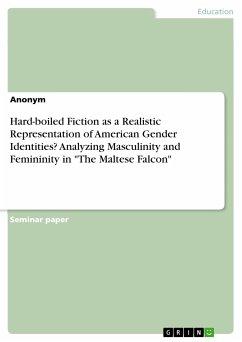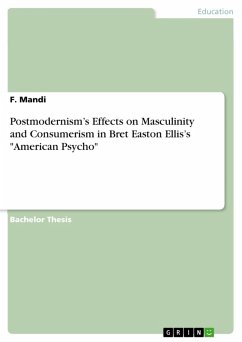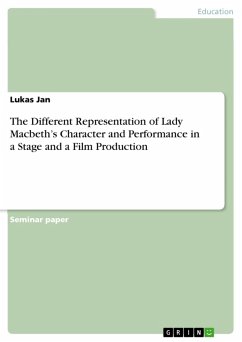Seminar paper from the year 2017 in the subject Didactics for the subject English - History of Literature, Eras, grade: 2,0, University of Paderborn, language: English, abstract: In this term paper, I am going to argue that the reason for the gender conflict as well as the gender development in hard-boiled detective fiction can be found in the historical background and historical incidents of which the United States suffered during the Twenties. Further, I will support Seesslen's claim that, after World War I, there was the public's desire for a more honest and harsh view of America which is fulfilled by the post-war realism used in hard-boiled fiction. For this, I will try to outline the realism in Dashiell Hammett's "The Maltese Falcon" (1930) as a representation and/or critique of the United States in the 1920s. This particular novel is used because it can be seen as representative for many other hard-boiled fictions and the hard-boiled genre in general as Dashiell Hammett's work redefined crime fiction. His stories mark an obvious shift from the classical detective story in which the detective is the main crime solver in middle-class suburban places, to an urban space in the United States where organized crime, gangsters and corruption pervade the city. The characters involved in "The Maltese Falcon" will help to draw a certain connection between the historical development of the United States and the development of men and women in hard-boiled fiction. For that reason, in chapter 2, I will try to define the hard-boiled genre and in which way its plot structure and themes are shaped by the historical events and social issues of that time. In chapter 3, I will present the two archetypal characters, the Femme fatale and the tough guy, in hard-boiled fiction. Because both of them can be found in "The Maltese Falcon", I will use this novel to analyse masculinity, or more precisely, the protagonist Sam Spade, and femininity, mainly Brigid O'Shaughnessy, in chapter 4 and 5. By means of the conclusion in chapter 6 I will summarize the main results in order to support my thesis that the hard-boiled fictions' plot, especially the gender identities, mirror historical incidents and social developments the United States underwent during 1920 onward. In addition, I will put the insights on femininity and masculinity in hard-boiled detective fictions in a broader context concerning the film industry and the hard-boiled fiction's impact on following genres, just like Film noir.
Dieser Download kann aus rechtlichen Gründen nur mit Rechnungsadresse in A, B, BG, CY, CZ, D, DK, EW, E, FIN, F, GR, HR, H, IRL, I, LT, L, LR, M, NL, PL, P, R, S, SLO, SK ausgeliefert werden.









